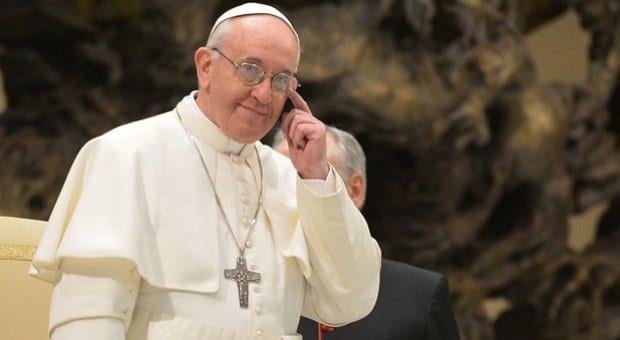Pope Benedict XVI once told us that homosexuality is an “objective disorder.”
On another occasion, he deemed it “a strong tendency ordered toward an intrinsic moral evil.”
His predecessor, John Paul II, found it “legitimate and necessary” to ask if gay marriage is part of a clandestine and more insidious “new ideology of evil, which attempts to pit human rights against the family and against man.”
Juxtapose those choice statements with the reported words and actions of the latest successor of St Peter to take up residence at the Vatican.
Challenged about his stance on homosexuality, Argentina’s Jorge Mario Bergoglio, aka Pope Francis I, throws the ball back in his interrogator’s court.
“Tell me: when God looks at a gay person, does he endorse the existence of this person with love, or reject and condemn this person?”
But his promising rhetorical start ends with an equivocal “We must always consider the person,” followed by a more obscure statement about “the mystery” of human beings.
More recently, an Italian Catholic LGBT group that reached out to Francis later claimed that he gave them “his blessing.”
What’s not to like from a cleric who has embraced the name of a saint heralded for his prayer about bringing faith where there is doubt, hope where there is despair and light where there is darkness?
In an era that is gluttonous about celebrity, Francis, with his friendly countenance, gregariousness in the presence of crowds and understanding of the importance of optics and the well-turned phrase, is poised to become a religious rock star.
And while his words and deeds thus far are flummoxing the Church’s more conservative segments, they are giving its more liberal adherents a glimmer of hope that his tenure will bring about much-needed change, including bringing its disillusioned sheep — who’ve been departing in droves — back to the fold.
Moreover, in the context of contemporary rightwing nuttery, Francis’s outreach, if not substance, feels like a gale-force cleansing of the homophobic stench issuing from the likes of the American Family Association, the National Organization for Marriage, Pat Robertson and the unrepentant Scott Lively, now facing a human-rights trial over his alleged role in fostering a hostile environment for gay Ugandans.
But really, how different is Francis’s cajoling rhetoric from that of a corporation or PR firm pitching a client’s new and improved product as a real departure from its classic version?
As a number of Church observers have pointed out, especially in the wake of the short-lived hope invested in the Second Vatican Council of the 1960s, the changes — such as what language should be used for Mass — were more cosmetic than revolutionary.
As much as I’d like to flirt with this latest successor to Obama’s Yes We Can–ism, I am as yet reluctant to fall for this smiling, twinkly eyed, avuncular man in robes who seems to be offering more than he realistically can, or really intends, to deliver.
Just recently, the Vatican announced that a synod of bishops will convene to discuss the “pastoral care of families.” How far, if anywhere, will it go toward acknowledging families with same-sex parents or families with gay and trans children?
If asked, I hope, but truly doubt, that Francis will provide an answer that doesn’t rely on the ambiguity of a rhetorical question.
Natasha Barsotti is Xtra Vancouver’s staff reporter.


 Why you can trust Xtra
Why you can trust Xtra


